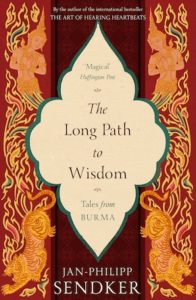The clever monkeys
by Jan-Philipp SendkerA good long time ago there lived a man who wove and sold hats of straw. All of the farmers needed his hats to keep their heads out of the sun while they worked in the fields, so business was generally good. One day after finishing a batch of hats he packed them in a large basket and set off for the next village. It was market day there, and many people would be keen to buy his goods.
It was a strenuous hike and the sun was blazing in the blue sky, so the hat maker decided to rest awhile in the shade of a sprawling banyan tree. He intended only to catch his breath, but in the heat of the day he soon fell asleep.
When he woke some time later he could tell by the sun that he had slept a long while. Now he would have to hurry to get to the village in time. He looked around grumpily for his hats, and he could hardly believe his eyes – all of them were gone! Only the one on his head remained. The hat maker hastily searched around the massive tree, wondering what could have happened. He looked among the roots and bushes, but he did not find a single hat.
At some point he heard laughter in the tree above him. He glanced up, and in the boughs he saw a large troop of monkeys, each one with a straw hat on its head! They split their sides laughing while the hat maker cursed and threatened them and went through all kinds of contortions trying to get his hats back. The amused monkeys merely mimicked his furious gestures!
The hat maker was outraged at the way the monkeys were mocking him, but in the end it gave him an idea. The animals reminded him of ill-mannered children. Perhaps he could outsmart them.
“Oh, what a beautiful hat!” he said loudly. He took his hat in his hands, examined it from all sides, and finally put it back on his head. The monkeys imitated him.
Next the hat maker declared: “It’s so hot today, isn’t it?” He took his hat off again and fanned himself with it. Up in the treetop the monkeys squealed with glee and mocked him again.
A third time the man took the hat off his head and examined it critically. “Oh, I don’t like this hat anymore,” he said, and threw it decisively to the ground.
The monkeys laughed, took their hats in their hands, and threw them all to the ground.
Pleased with this outcome, the hat maker chuckled while the monkeys, enraged by this trick, screamed and thrashed around in the tree, but did not dare to come down. The man quickly gathered the hats and went on his way.
Many years later the hat maker’s son took over his father’s business. The son had children of his own, the oldest of whom decided to carry on his grandfather’s trade. And so it came to pass that more than twenty years later a young man with a basket full of straw hats was making his way to the very same village, where again it was a market day.
Suddenly he remembered a story his grandfather had often told him. He looked up into the tree, and sure enough, there sat a band of monkeys with broad grins on their faces and straw hats on their heads.”
It was still a difficult road, and again it was a hot day when the young man stopped to rest under the very same tree where his grandfather once had napped. Like his grandfather, the young man fell asleep and woke to find that all the laboriously woven hats had vanished. He looked here and there without any idea what could have become of them. Suddenly he remembered a story that his grandfather had often told him when he was just a boy. So he looked up into the tree, and sure enough, there sat a band of monkeys with broad grins on their faces and straw hats on their heads.
The young man took off his hat, examined it briefly, and put it back on.
The monkeys did the same.
The young hat maker then fanned himself theatrically with his hat. Again the monkeys screeched, swung about in the branches, and imitated the man.
The grandson confidently took his hat in hand a third time. He held it high for all to see. The monkeys watched with bated breath. The young man exaggerated a look of disgust and called loudly: “I do not like this hat at all anymore.” With that he flung the hat energetically into the grass.
High above him the monkeys burst into laughter. They shrieked and bared their teeth, they thrashed around in the treetop, they threw their hats into the air, and they caught them again. Not a single monkey threw his hat to the ground.
The young man stood helpless at the foot of the tree. Then he saw one of the monkeys climbing down to him. With one final leap the animal landed right in front of him. “You have a grandfather who told you tales and taught you a trick or two,” he said with a broad grin, “but we monkeys have grandfathers, too!”
from The Long Path to Wisdom: Tales from Burma (Polygon, £8.99/Other Press, $16.95)
 Jan-Philipp Sendker was the American correspondent for Stern from 1990 to 1995, and its Asian correspondent from 1995 to 1999. His first novel The Art of Hearing Heartbeats was an international bestseller, and he’s the author of A Well-Tempered Heart, and the China trilogy Whispering Shadows, Dragon Games and At the Other End of the Night. He lives in Berlin with his family. The Long Path to Wisdom, translated by Lisa Liesener and Kevin Wiliarty, is published in paperback and eBook by Polygon and Other Press.
Jan-Philipp Sendker was the American correspondent for Stern from 1990 to 1995, and its Asian correspondent from 1995 to 1999. His first novel The Art of Hearing Heartbeats was an international bestseller, and he’s the author of A Well-Tempered Heart, and the China trilogy Whispering Shadows, Dragon Games and At the Other End of the Night. He lives in Berlin with his family. The Long Path to Wisdom, translated by Lisa Liesener and Kevin Wiliarty, is published in paperback and eBook by Polygon and Other Press.
Read more
janphilippsendker.de
Facebook: Jan-Philipp Sendker


